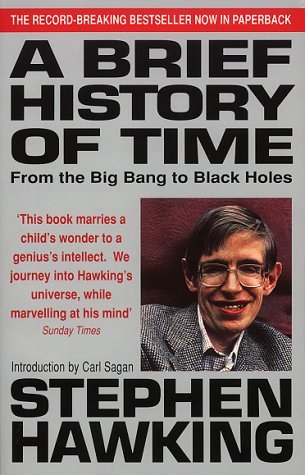| A Brief History of Time. Stephen Hawking Did high-school science leave you mystified, puzzled or just plain blank? Well, maybe it is time you got acquainted with Stephen Hawking or rather, his seminal book, A Brief History of Time. From the Big Bang to Black Holes. First published in 1988, the book instantly acquired bestseller status. No meager feat considering it deals with stuff that would leave average readers rolling their eyes before they consigned it back to the shelf. Most people know about Hawking, the disabled, brilliant celebrity physicist and cosmologist whom Carl Sagan described as a worthy successor to Isaac Newton. A Brief History of Time reveals even more dimensions to the man. For one, there is his literary ability. There are few scientific books that present incredibly complex theories with as much simplicity as Hawking does. Using comparisons from real life and explaining knotty ideas with great clarity, Hawking seduces you to step into the abstruse world of wormholes, time travel and quantum mechanics. And all this delivered in a style that is fun to read, engagingly witty and never condescending. Notably, there is just one equation featuring in the whole book, E = mc², thanks to an editor who warned Hawking about the proportional drop in readership that would result for every equation appearing in the text. A liberal smattering of illustrations throughout the book also helps in simplifying complex ideas. Beginning from the time of Aristotle, Hawking traces the path of mankind's theories of the universe until Einstein came along and forever changed our notions of space and time. The readability factor comes from the care with which he gives explanations, apart from the reverence in which he holds his predecessors. Also included are chapters on the expanding universe, quarks, black holes, how time works, the Big Bang theory and how the universe could end. Delightful and enlightening as all this is, the non-scientific reader could yet feel a trifle bogged down in places. No matter, just skip ahead, for it is amazing how much you can still pick up. |  |
| Is there a single theory, one that will conclusively unravel the mystery of the universe? We are not far off from finding it, says Hawking, ending his book thus: "If we find a unified theory, it would be the ultimate triumph, for then, we would know the mind of God." Go ahead and buy the book. It is definitely worth reading. | |